中考专题复习之动词时态
图片预览
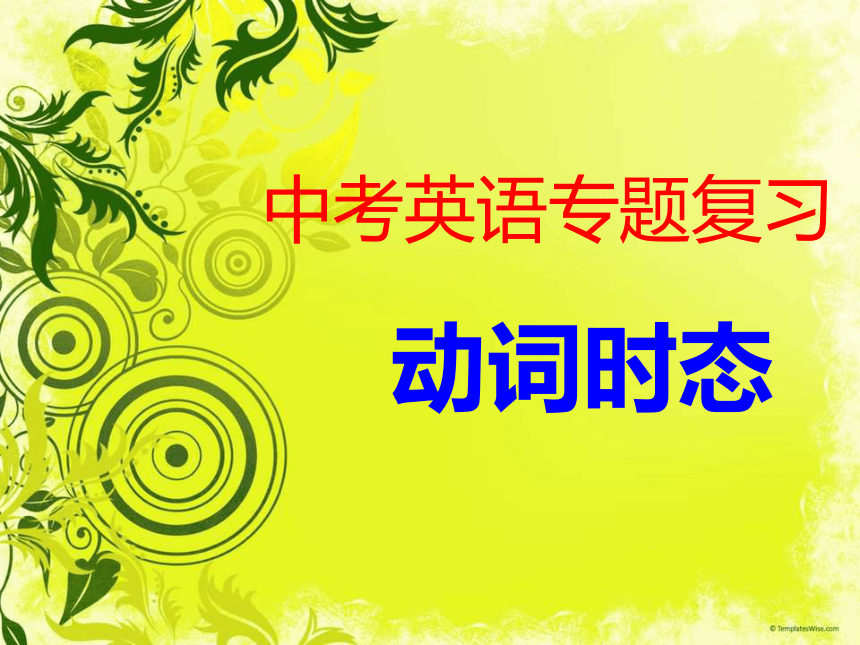
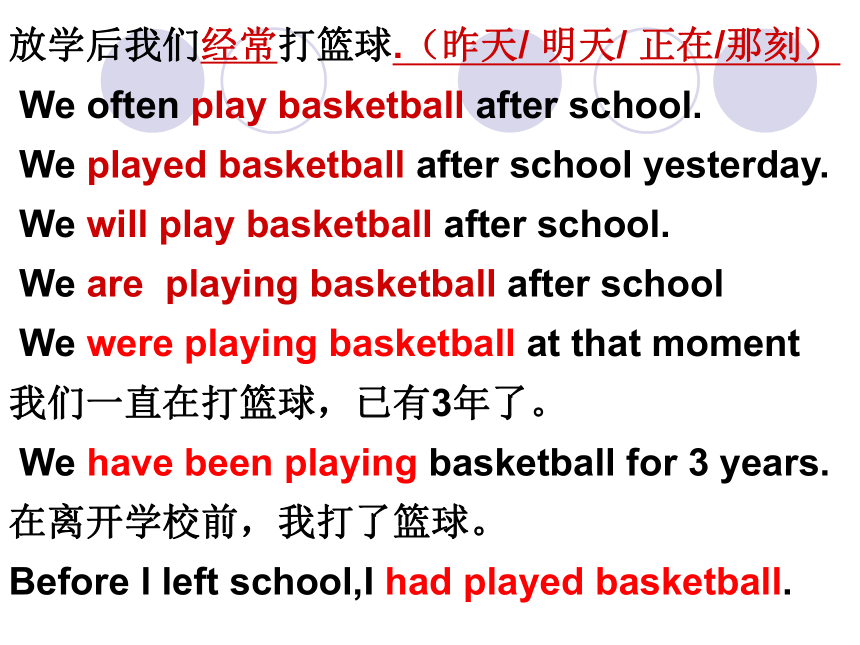
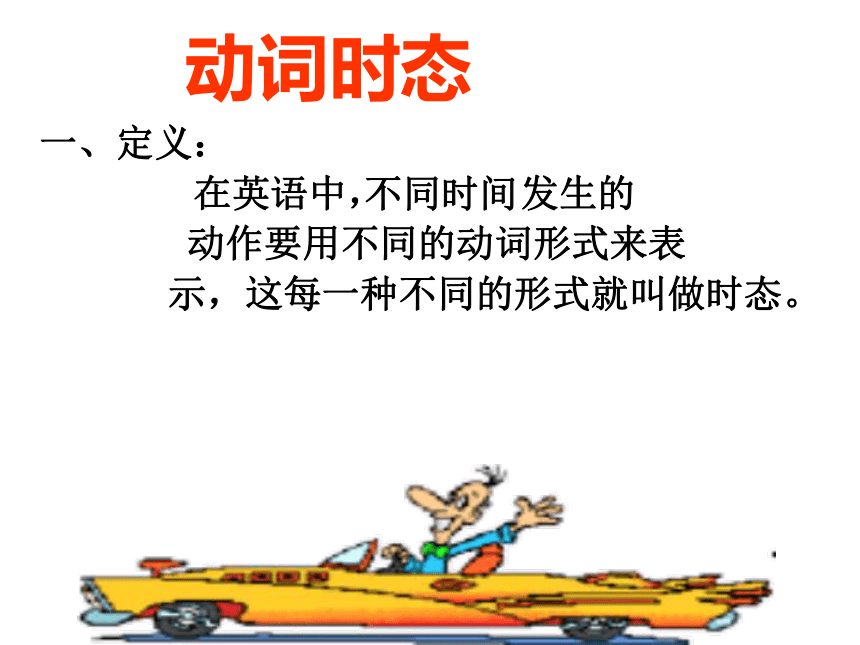
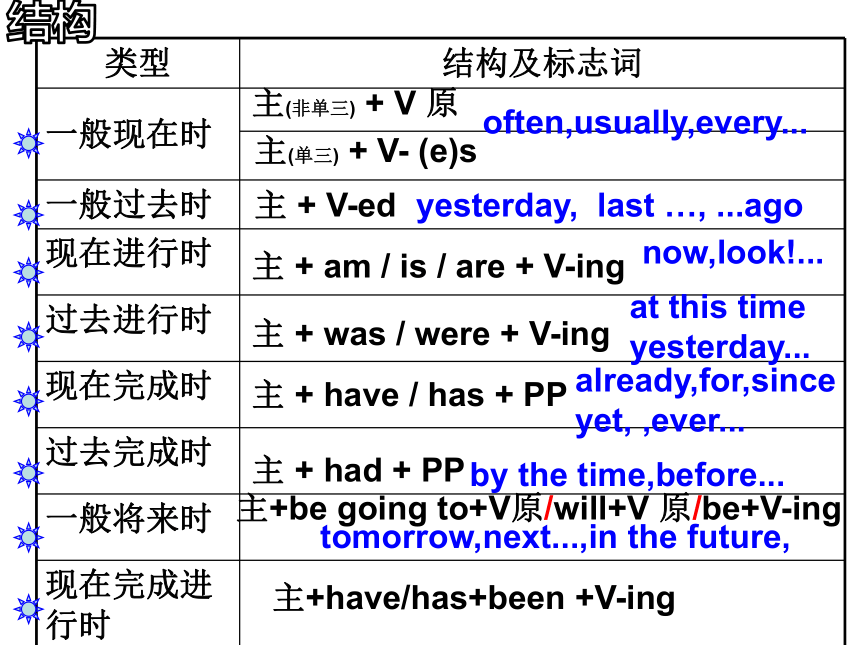
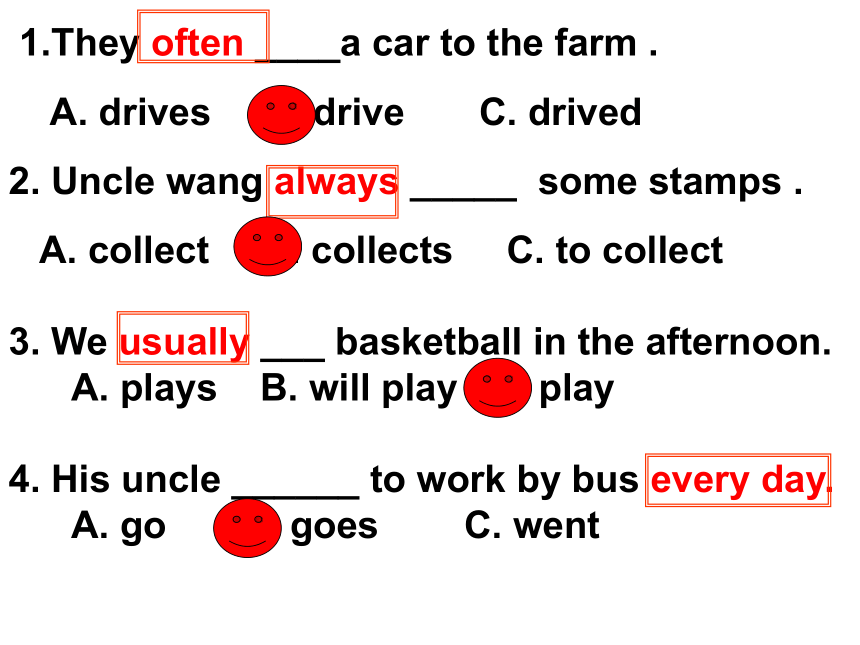
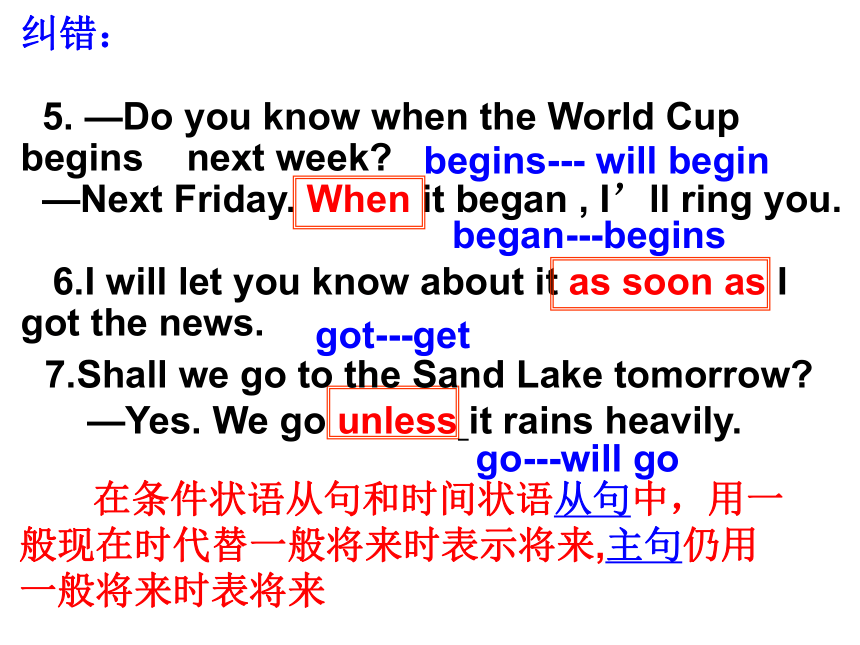
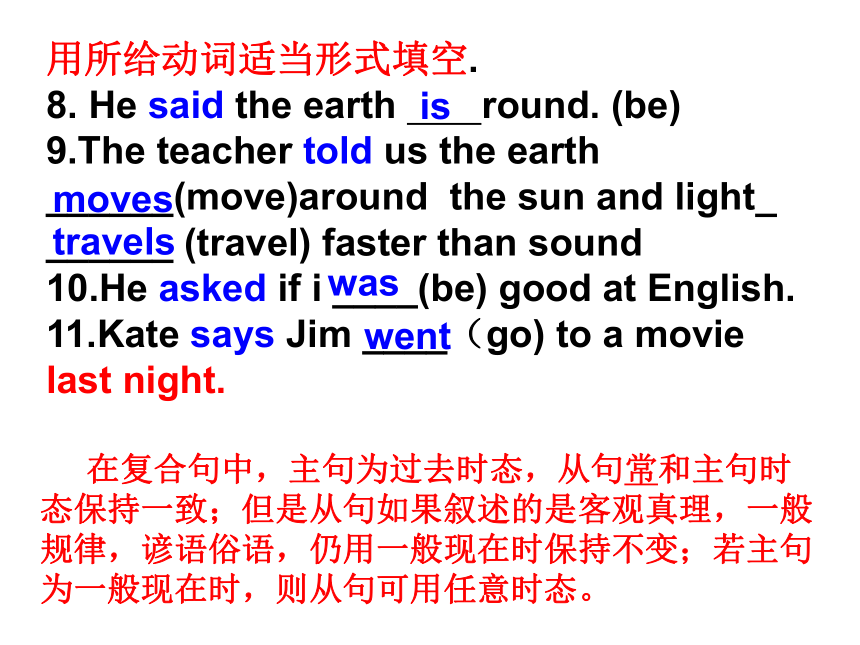
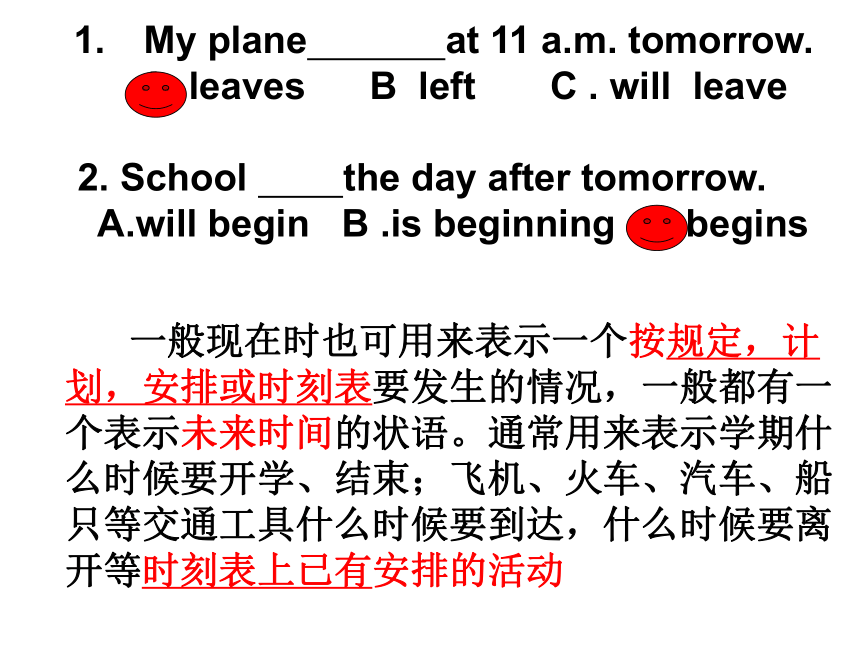
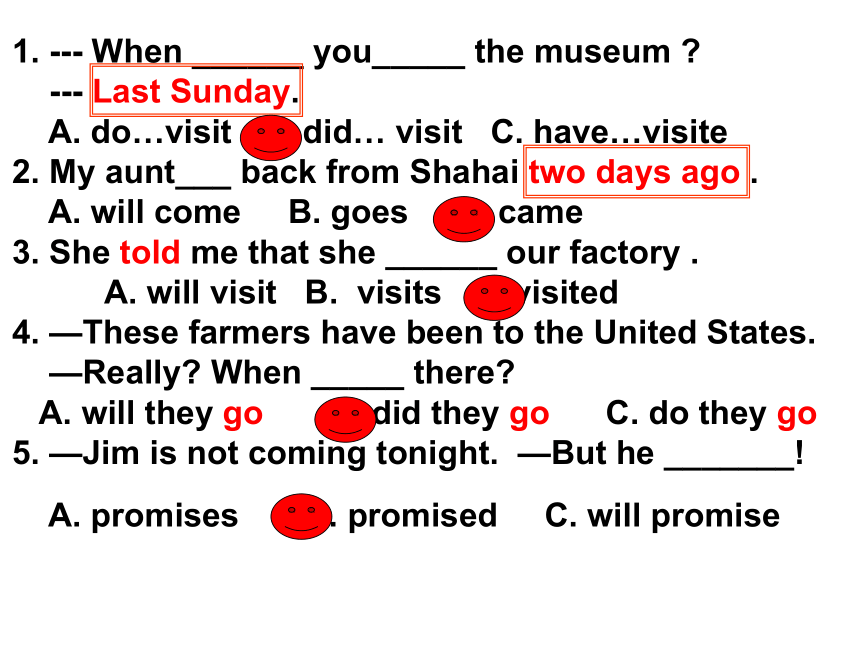
文档简介
课件23张PPT。中考英语专题复习动词时态放学后我们经常打篮球.(昨天/ 明天/ 正在/那刻)
We often play basketball after school.
We played basketball after school yesterday.
We will play basketball after school.
We are playing basketball after school
We were playing basketball at that moment
我们一直在打篮球,已有3年了。
We have been playing basketball for 3 years.
在离开学校前,我打了篮球。
Before l left school,I had played basketball.动词时态一、定义:
在英语中, 发生的
动作要用不同的动词形式来表
示,这每一种不同的形式就叫做时态。不同时间结构主(非单三) + V 原主(单三) + V- (e)s主 + V-ed主 + am / is / are + V-ing主 + was / were + V-ing主 + have / has + PP主 + had + PP主+be going to+V原/will+V 原/be+V-ingoften,usually,every...yesterday, last …, ...ago
now,look!...at this time yesterday...already,for,since yet, ,ever...by the time,before...tomorrow,next...,in the future,主+have/has+been +V-ing 1.They often ____a car to the farm .
A. drives B. drive C. drived
2. Uncle wang always _____ some stamps .
A. collect B. collects C. to collect
3. We usually ___ basketball in the afternoon.
A. plays B. will play C. play
4. His uncle ______ to work by bus every day.
A. go B. goes C. went
纠错:
5. —Do you know when the World Cup begins next week?
—Next Friday. When it began , I’ll ring you.
6.I will let you know about it as soon as I got the news.
在条件状语从句和时间状语从句中,用一般现在时代替一般将来时表示将来,主句仍用一般将来时表将来7.Shall we go to the Sand Lake tomorrow?
—Yes. We go unless it rains heavily.
begins--- will beginbegan---beginsgot---getgo---will go用所给动词适当形式填空.
8. He said the earth round.?(be)
9.The teacher told us the earth ______(move)around the sun and light_ ______ (travel) faster than sound
10.He asked if i ____(be) good at English.
11.Kate says Jim ____(go) to a movie last night.
在复合句中,主句为过去时态,从句常和主句时态保持一致;但是从句如果叙述的是客观真理,一般规律,谚语俗语,仍用一般现在时保持不变;若主句为一般现在时,则从句可用任意时态。ismovestravelswaswent 1. My plane at 11 a.m. tomorrow.
A. leaves B left C . will leave
2. School the day after tomorrow.
A.will begin B .is beginning C. begins 一般现在时也可用来表示一个按规定,计划,安排或时刻表要发生的情况,一般都有一个表示未来时间的状语。通常用来表示学期什么时候要开学、结束;飞机、火车、汽车、船只等交通工具什么时候要到达,什么时候要离开等时刻表上已有安排的活动 --- When ______ you_____ the museum ?
--- Last Sunday.
A. do…visit B. did… visit C. have…visite
2. My aunt___ back from Shahai two days ago .
A. will come B. goes C. came
3. She told me that she ______ our factory .
A. will visit B. visits C. visited
4. —These farmers have been to the United States.
—Really? When _____ there?
A. will they go B. did they go C. do they go
5. —Jim is not coming tonight. —But he _______!
A. promises B. promised C. will promise用所给动词的适当形式填空
1.--- Where is Mike?
---Look! He is over there. He _________ his car. (wash)
2. Listen ! Mr. Wang__________ a song with Mike. (sing)
3. Where is James ? He _________ with his brother. (run)
4. He ________ _ his homework now. (do)
5. Mr. Smith _________ short stories, but he ___________ a TV play at present.(write)
is washingis singingis runningis doing writesis writing 1.The last time I __ Jane ,she __ cotton in the fields. ? A. see, was picking B. saw, picked
C. saw, was picking 2. I don ' t think Jim saw me, he __ into space. ? A. just stared B. was just staring
C. has just stared
3. I first met Lisa three years ago, She ___ at a radio shop at that time. ? A. has worked B. was working
C. had been working
4.What ___ at this time yesterday
A.are you doing B.were you doing
C.did you do D. do you do
1.—Jimmy is leaving for a holiday.
—Really? Where _____ he _____?
A. does; go B. will; go C. did; go
2. —Shall we go to the Sand Lake tomorrow?
—Yes. We ____ unless it rains heavily.
A. will go B.went C. goes
3.Jimmy ____ for a holiday next week.
A. is leaving B. leaves C. left
4.I __ to the cinema. I __there every Sunday. A. go. go B. am going, go
C. go. am goingThey _____ give me a ticket tomorrow.
A. will B.will going to C. don’t
2. ____ you go to have a picnic next Sunday ?
A. Did B. Will C. Do
3. I ask who _____ go with me in two days .
A. will B. would C. can
4. They didn’t know what they __ do soon.
A. will B. would C. don’t
1. Lilei ___ the pen since last year.
A.has had B.bought C have bought
2. He ___ already finished his homework
A.does B.have C.has
3. — Peter lost his bike yesterday.
— ___ he ___ it yet?
A. Has; looked for B. Does; find
C. Has; found
4. Who is he? I ____him before.
A. haven’t heard of B. didn’t hear of
C. haven’t heard from
5.We haven't finished our homework___.
A.already B.ever C.yet6. I ____ him these days.
A. haven’t hear from
B. didn’t hear of
C. haven’t heard from
7. I have __ 5,000 words so far.
A.learnt B. learn C. learning
8. The old man ______ China several times in the past 10 years.
A.has been to B.wen to C.has gone to用for 或since 填空
1.It’s ten years 2003 .
2. I have been here ____ 4 years.
3. We have learnt English ____ six years ago.
4.We have learnt English ____ six years .
5. How many hours is it ____ you left school?
6.It's five years ______ I came here.
for + 时间段
since + 时间点/一般过去时的句子sinceforsincesincesincefor1. —How long can I ____ this book?
—Two weeks
A.borrow B.keep C.lend
2. Her father___in 1990 and her husband___for more than five years.
A. has died, has died
B. has died, dead
C. died, has been dead
3. I have___ this nice watch for two years.
A. had B. bought C.borrowed
4. He___his home for ten years.
A. has left B. was away from
C.has been away from短暂性动词和延续性动词不
与
时
间
段
连
用可
与
时
间
段
连
用be (in) here / therebe a member ofbe deadbe onhavebe awaykeepbe overbe open be closedbe married 5. He___a League member for three years.
A. is B. has been C.has became
6. Lihua's brother has___for two years.
A. joined the army
B. been in the army
C. became a soldier
7. He hasn't____from Guangzhou ever since he left school
A.left B.been away C.been left
8. Betty ___ here for two hours. She ___ here at 8:00 this morning.
A. has been; came
B. has been; has come C. was; came8. The film ___ for five minutes.
A. began B. has been on C. has begun
9. You are too late. The shop ___ for many hours.
A. closed
B. has been closed
C. has closed
10. Mary ___ Tom in 2000. They ___ for 8 years.
A.married; have been married
B.married; have married
C.marries; have been married现在完成时与一般过去时的区别losthave lost表示过去某时发生的动作或单纯叙述过去的事情,强调动作。
表示过去发生的动作对现在的影响,强调的是影响。 I have been learning English for 3 years .现在完成进行时表示过去的动作一直持续到现在甚至会延续下去had纠错:
1. When I got outside, the bus left.
2.By the time I got there ,the film has begun
3.They left before I returnedleft---had lefthas ---hadleft------had leftTHE END
We often play basketball after school.
We played basketball after school yesterday.
We will play basketball after school.
We are playing basketball after school
We were playing basketball at that moment
我们一直在打篮球,已有3年了。
We have been playing basketball for 3 years.
在离开学校前,我打了篮球。
Before l left school,I had played basketball.动词时态一、定义:
在英语中, 发生的
动作要用不同的动词形式来表
示,这每一种不同的形式就叫做时态。不同时间结构主(非单三) + V 原主(单三) + V- (e)s主 + V-ed主 + am / is / are + V-ing主 + was / were + V-ing主 + have / has + PP主 + had + PP主+be going to+V原/will+V 原/be+V-ingoften,usually,every...yesterday, last …, ...ago
now,look!...at this time yesterday...already,for,since yet, ,ever...by the time,before...tomorrow,next...,in the future,主+have/has+been +V-ing 1.They often ____a car to the farm .
A. drives B. drive C. drived
2. Uncle wang always _____ some stamps .
A. collect B. collects C. to collect
3. We usually ___ basketball in the afternoon.
A. plays B. will play C. play
4. His uncle ______ to work by bus every day.
A. go B. goes C. went
纠错:
5. —Do you know when the World Cup begins next week?
—Next Friday. When it began , I’ll ring you.
6.I will let you know about it as soon as I got the news.
在条件状语从句和时间状语从句中,用一般现在时代替一般将来时表示将来,主句仍用一般将来时表将来7.Shall we go to the Sand Lake tomorrow?
—Yes. We go unless it rains heavily.
begins--- will beginbegan---beginsgot---getgo---will go用所给动词适当形式填空.
8. He said the earth round.?(be)
9.The teacher told us the earth ______(move)around the sun and light_ ______ (travel) faster than sound
10.He asked if i ____(be) good at English.
11.Kate says Jim ____(go) to a movie last night.
在复合句中,主句为过去时态,从句常和主句时态保持一致;但是从句如果叙述的是客观真理,一般规律,谚语俗语,仍用一般现在时保持不变;若主句为一般现在时,则从句可用任意时态。ismovestravelswaswent 1. My plane at 11 a.m. tomorrow.
A. leaves B left C . will leave
2. School the day after tomorrow.
A.will begin B .is beginning C. begins 一般现在时也可用来表示一个按规定,计划,安排或时刻表要发生的情况,一般都有一个表示未来时间的状语。通常用来表示学期什么时候要开学、结束;飞机、火车、汽车、船只等交通工具什么时候要到达,什么时候要离开等时刻表上已有安排的活动 --- When ______ you_____ the museum ?
--- Last Sunday.
A. do…visit B. did… visit C. have…visite
2. My aunt___ back from Shahai two days ago .
A. will come B. goes C. came
3. She told me that she ______ our factory .
A. will visit B. visits C. visited
4. —These farmers have been to the United States.
—Really? When _____ there?
A. will they go B. did they go C. do they go
5. —Jim is not coming tonight. —But he _______!
A. promises B. promised C. will promise用所给动词的适当形式填空
1.--- Where is Mike?
---Look! He is over there. He _________ his car. (wash)
2. Listen ! Mr. Wang__________ a song with Mike. (sing)
3. Where is James ? He _________ with his brother. (run)
4. He ________ _ his homework now. (do)
5. Mr. Smith _________ short stories, but he ___________ a TV play at present.(write)
is washingis singingis runningis doing writesis writing 1.The last time I __ Jane ,she __ cotton in the fields. ? A. see, was picking B. saw, picked
C. saw, was picking 2. I don ' t think Jim saw me, he __ into space. ? A. just stared B. was just staring
C. has just stared
3. I first met Lisa three years ago, She ___ at a radio shop at that time. ? A. has worked B. was working
C. had been working
4.What ___ at this time yesterday
A.are you doing B.were you doing
C.did you do D. do you do
1.—Jimmy is leaving for a holiday.
—Really? Where _____ he _____?
A. does; go B. will; go C. did; go
2. —Shall we go to the Sand Lake tomorrow?
—Yes. We ____ unless it rains heavily.
A. will go B.went C. goes
3.Jimmy ____ for a holiday next week.
A. is leaving B. leaves C. left
4.I __ to the cinema. I __there every Sunday. A. go. go B. am going, go
C. go. am goingThey _____ give me a ticket tomorrow.
A. will B.will going to C. don’t
2. ____ you go to have a picnic next Sunday ?
A. Did B. Will C. Do
3. I ask who _____ go with me in two days .
A. will B. would C. can
4. They didn’t know what they __ do soon.
A. will B. would C. don’t
1. Lilei ___ the pen since last year.
A.has had B.bought C have bought
2. He ___ already finished his homework
A.does B.have C.has
3. — Peter lost his bike yesterday.
— ___ he ___ it yet?
A. Has; looked for B. Does; find
C. Has; found
4. Who is he? I ____him before.
A. haven’t heard of B. didn’t hear of
C. haven’t heard from
5.We haven't finished our homework___.
A.already B.ever C.yet6. I ____ him these days.
A. haven’t hear from
B. didn’t hear of
C. haven’t heard from
7. I have __ 5,000 words so far.
A.learnt B. learn C. learning
8. The old man ______ China several times in the past 10 years.
A.has been to B.wen to C.has gone to用for 或since 填空
1.It’s ten years 2003 .
2. I have been here ____ 4 years.
3. We have learnt English ____ six years ago.
4.We have learnt English ____ six years .
5. How many hours is it ____ you left school?
6.It's five years ______ I came here.
for + 时间段
since + 时间点/一般过去时的句子sinceforsincesincesincefor1. —How long can I ____ this book?
—Two weeks
A.borrow B.keep C.lend
2. Her father___in 1990 and her husband___for more than five years.
A. has died, has died
B. has died, dead
C. died, has been dead
3. I have___ this nice watch for two years.
A. had B. bought C.borrowed
4. He___his home for ten years.
A. has left B. was away from
C.has been away from短暂性动词和延续性动词不
与
时
间
段
连
用可
与
时
间
段
连
用be (in) here / therebe a member ofbe deadbe onhavebe awaykeepbe overbe open be closedbe married 5. He___a League member for three years.
A. is B. has been C.has became
6. Lihua's brother has___for two years.
A. joined the army
B. been in the army
C. became a soldier
7. He hasn't____from Guangzhou ever since he left school
A.left B.been away C.been left
8. Betty ___ here for two hours. She ___ here at 8:00 this morning.
A. has been; came
B. has been; has come C. was; came8. The film ___ for five minutes.
A. began B. has been on C. has begun
9. You are too late. The shop ___ for many hours.
A. closed
B. has been closed
C. has closed
10. Mary ___ Tom in 2000. They ___ for 8 years.
A.married; have been married
B.married; have married
C.marries; have been married现在完成时与一般过去时的区别losthave lost表示过去某时发生的动作或单纯叙述过去的事情,强调动作。
表示过去发生的动作对现在的影响,强调的是影响。 I have been learning English for 3 years .现在完成进行时表示过去的动作一直持续到现在甚至会延续下去had纠错:
1. When I got outside, the bus left.
2.By the time I got there ,the film has begun
3.They left before I returnedleft---had lefthas ---hadleft------had leftTHE END
同课章节目录
- 词法
- 名词
- 动词和动词短语
- 动词语态
- 动词时态
- 助动词和情态动词
- 非谓语动词
- 冠词
- 代词
- 数词和量词
- 形容词副词及其比较等级
- 介词和介词短语
- 连词和感叹词
- 构词法
- 相似、相近词比较
- 句法
- 陈述句
- 一般疑问句和否定疑问句
- 特殊疑问句及选择疑问句
- 反意疑问句
- 存在句(There be句型)
- 宾语从句
- 定语从句
- 状语从句
- 主谓一致问题
- 简单句
- 并列句
- 复合句
- 主谓一致
- 主、表语从句
- 名词性从句
- 直接引语和间接引语
- 虚拟语气
- 感叹句
- 强调句
- 倒装句
- 祈使句
- 句子的成分
- 句子的分类
- 题型专区
- 单项选择部分
- 易错题
- 完形填空
- 阅读理解
- 词汇练习
- 听说训练
- 句型转换
- 补全对话
- 短文改错
- 翻译
- 书面表达
- 任务型阅读
- 语法填空
- 其他资料
